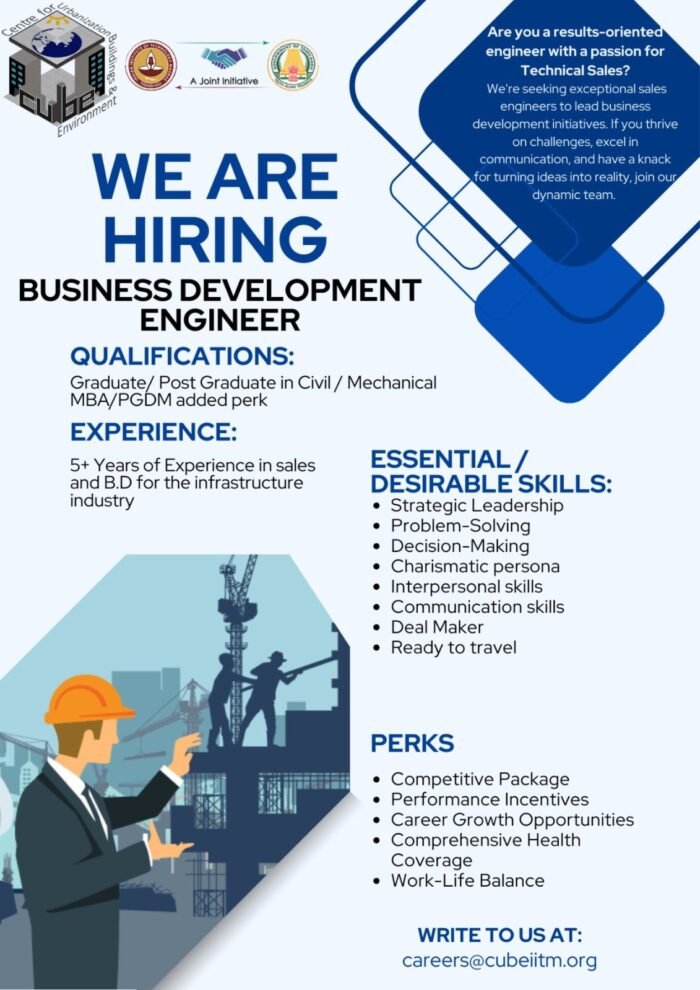Job Opening for Business Development Civil Engineer

Business Development Civil Engineer
The role of a Business Development Engineer is a distinct and critical position within an organization, blending technical engineering knowledge with essential business acumen. Unlike traditional engineering roles, which typically focus on design, analysis, or development of products and systems, business development engineering encompasses a more multifaceted approach. This position bridges the gap between engineering teams and business objectives, ensuring that the technical resources align with market demands and strategic goals.
A Business Development Engineer is tasked with identifying growth opportunities, assessing market trends, and developing strategies to capitalize on those trends. This goes beyond mere product development; it requires a comprehensive understanding of customer needs, competitive analysis, and the economic landscape. Consequently, professionals in this role must possess a diverse skill set that includes strong analytical skills, effective communication capabilities, and a deep understanding of both technical and commercial aspects of engineering.
In contrast to traditional engineers who may specialize in specific areas such as mechanical, electrical, or software engineering, Business Development Engineers operate in a multidisciplinary environment. Their work often involves collaboration with various departments, including sales, marketing, and project management. This collaborative framework is crucial for identifying innovative solutions that not only address technical challenges but also contribute to the overall business strategy.
The significance of this role within an organization cannot be overstated. Business Development Engineers facilitate growth by driving the adoption of new technologies and systems while ensuring that engineering initiatives are aligned with business objectives. By blending engineering prowess with strategic insights, they play a pivotal role in fostering innovation and maintaining a competitive edge in a rapidly evolving marketplace.
Key Responsibilities of a Business Development Engineer
The role of a business development engineer is integral in driving growth and innovation within an organization. One primary responsibility is identifying business opportunities that align with the company’s strategic goals. This involves analyzing industry trends, recognizing gaps in the market, and pinpointing potential clients who could benefit from the company’s offerings. Through a systematic approach in evaluating and prioritizing opportunities, business development engineers contribute significantly to the organization’s expansion efforts.
Conducting thorough market research is another essential duty. A business development engineer assesses competitive landscapes and gathers data on target markets. This information is crucial for understanding customer needs and preferences, enabling the organization to tailor its products and services accordingly. By synthesizing this research into actionable insights, business development engineers ensure that marketing strategies are data-driven and effective.
Building and maintaining robust client relationships is also a vital aspect of the role. Business development engineers often engage with stakeholders at various levels, from initial contact to ongoing account management. By fostering strong relationships, they help cultivate trust, communication, and collaboration, which are essential for successful project execution. These interactions not only support sales but also facilitate a culture of customer-centricity within the company.
Another key responsibility is developing compelling proposals that present the company’s value proposition. Business development engineers craft tailored solutions that address specific client needs, often incorporating technical details and strategic advantages. This proposal development requires collaboration with technical teams to ensure feasibility and competitiveness. Additionally, business development engineers work closely with cross-functional teams, integrating diverse perspectives and resources to enhance project outcomes. By collaborating across departments, they unify expertise and strengthen the organization’s ability to respond to market demands effectively.
Necessary Skills and Qualifications
To excel as a business development engineer, a diverse set of skills and qualifications is essential. One of the primary requirements is a solid technical proficiency in the relevant engineering discipline. This is crucial as business development engineers often bridge the gap between technical capabilities and client requirements, ensuring that solutions meet market needs. An understanding of engineering principles, combined with knowledge of product development processes, allows these professionals to identify potential opportunities and present them effectively to stakeholders.
Effective communication skills are another vital component of success in this role. Business development engineers must be adept at conveying technical information clearly and persuasively to non-technical audiences, including clients and potential partners. Strong negotiation skills are equally important, as they often play a key role in shaping agreements and contracts. The ability to negotiate favorable terms while maintaining positive relationships is critical in a competitive landscape.
Project management expertise is frequently needed, as business development engineers oversee various initiatives from conception to execution. Being organized and detail-oriented is paramount, as they juggle multiple projects and deadlines. Familiarity with project management tools and methodologies can significantly enhance their effectiveness in coordinating efforts with different teams.
A comprehensive understanding of market dynamics is essential for identifying opportunities and staying competitive. Business development engineers should possess the analytical skills to assess market trends and inform strategic decisions. Educational qualifications typically include a bachelor’s degree in engineering, business, or a related field. Additional certifications in project management, sales, or negotiation can further enhance a candidate’s profile, elevating their potential in the field of business development.
Career Path and Opportunities in Business Development Engineering
The career trajectory for a business development engineer typically begins with foundational positions that focus on both technical and business acumen. Entry-level roles often include positions such as project engineer or business analyst, where professionals can gain valuable insights into project management and client interactions. These initial experiences are crucial as they allow engineers to understand the intricate relationship between engineering solutions and their market applications.Business Development Civil Engineer
As individuals gain experience, they can progress to more advanced roles such as senior business development engineer or account manager, where the responsibilities shift from execution to strategy. In these positions, professionals are tasked with developing strategies that align engineering projects with business goals, thereby requiring a strong grasp of market trends and customer needs. This growth not only enhances their leadership skills but also expands their network, opening doors to higher-level opportunities.
The demand for business development engineers has been on the rise, driven by the need for organizations to innovate and adapt in a competitive landscape. This growing necessity has led to various career paths that extend beyond traditional engineering roles. For instance, professionals may transition into consultancy, providing expert guidance to firms looking to enhance their market strategies or product offerings. Alternatively, some may move into management positions, leveraging their technical expertise to oversee project teams or business units.
Additionally, the evolving technological landscape continues to create opportunities for specialization within business development engineering. Areas such as sustainable engineering solutions or digital transformation consultancy are gaining prominence, allowing current and future professionals to carve out niches that align with emerging industry trends. Overall, the career path for business development engineers is diverse and offers numerous avenues for growth and advancement.Business Development Civil Engineer
Civil Engineering Software Click Here
More Details http://cubeiitm.org/









